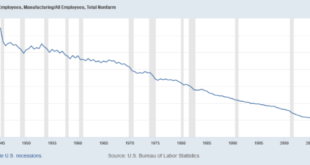Dean Baker revisits the major policy implications of the series. To Unf★ck America we need to lower the age for Medicare and expand Medicaid, add a public option to buy in, shrink the role of patents to bring competition back to the marketplace, and strengthen price controls on patented drugs. He also suggests policies at the state and local level like increasing minimum wage, providing unemployment insurance, creative work tax credits, and to increase corporate tax rates. He also urges...
Read More »The danger of teaching the wrong thing all too well
from Lars Syll It is well known that even experienced scientists routinely misinterpret p-values in all sorts of ways, including confusion of statistical and practical significance, treating non-rejection as acceptance of the null hypothesis, and interpreting the p-value as some sort of replication probability or as the posterior probability that the null hypothesis is true … It is shocking that these errors seem so hard-wired into statisticians’ thinking, and this suggests that our...
Read More »Weekend read – The big myth on inequality: it just happened
from Dean Baker The standard line in policy circles about the soaring inequality of the last four decades is that it is just an unfortunate outcome of technological change. As a result of technological developments, education is much more highly valued and physical labor has much less value. The drop in relative income for workers without college degrees is unfortunate and provides grounds for lots of hand wringing and bloviating in elite media outlets, but hey, what can you do?...
Read More »Byron Nelson vs. Braswell – Texas High School Football
Byron Nelson vs. Braswell - Texas High School Football 9/9/2022 7:00:00 PM Watch Live : https://www.youtube.com/redirect?q=https://best.inewshighschool.com/hs-football.php?live=Byron%20Nelson%20%20vs.%20Braswell%20 The Braswell (Little Elm, TX) varsity football team has a home non-conference game vs. Byron Nelson (Trophy Club, TX) on Friday, September 9 @ 7p. Bobcat @ Bengals Thanks For Watching!!..... ====================================================== Disclaimer :- Note: - Full Credit...
Read More »Royal vs. Othello – Washington High School Football
Royal vs. Othello - Washington High School Football 9/9/2022 7:00:00 PM Watch Live : https://www.youtube.com/redirect?q=https://best.inewshighschool.com/hs-football.php?live=Royal%20%20vs.%20Othello%20 The Othello (WA) varsity football team has a home non-conference game vs. Royal (Royal City, WA) on Friday, September 9 @ 7p. Knights @ Huskies Thanks For Watching!!..... ====================================================== Disclaimer :- Note: - Full Credit to Owners. All Images, Picture,...
Read More »Trinity Episcopal vs. Collegiate – Virginia High School Football
Trinity Episcopal vs. Collegiate - Virginia High School Football 9/9/2022 7:00:00 PM Watch Live : https://www.youtube.com/redirect?q=https://best.inewshighschool.com/hs-football.php?live=Trinity%20Episcopal%20%20vs.%20Collegiate%20 The Collegiate (Richmond, VA) varsity football team has a home conference game vs. Trinity Episcopal (Richmond, VA) on Friday, September 9 @ 4p. Titans @ Cougars Thanks For Watching!!..... ====================================================== Disclaimer :-...
Read More »South Pointe vs. Chester – South Carolina High School Football
South Pointe vs. Chester - South Carolina High School Football 9/9/2022 7:00:00 PM Watch Live : https://www.youtube.com/redirect?q=https://best.inewshighschool.com/hs-football.php?live=South%20Pointe%20%20vs.%20Chester%20 The Chester (SC) varsity football team has a home non-conference game vs. South Pointe (Rock Hill, SC) on Friday, September 9 @ 7:30p. Stallions @ Cyclones Thanks For Watching!!..... ====================================================== Disclaimer :- Note: - Full Credit...
Read More »Parkside vs. Cardozo – Washington, DC High School Football
Parkside vs. Cardozo - Washington, DC High School Football 9/9/2022 7:00:00 PM Watch Live : https://www.youtube.com/redirect?q=https://best.inewshighschool.com/hs-football.php?live=Parkside%20%20vs.%20Cardozo%20 The Cardozo (Washington, DC) varsity football team has a home non-conference game vs. Parkside (Washington, DC) on Friday, September 9 @ 6p. Eagles @ Clerks Thanks For Watching!!..... ====================================================== Disclaimer :- Note: - Full Credit to...
Read More »Parish Episcopal vs. LBJ Austin – Texas High School Football
Parish Episcopal vs. LBJ Austin - Texas High School Football 9/9/2022 7:00:00 PM Watch Live : https://www.youtube.com/redirect?q=https://best.inewshighschool.com/hs-football.php?live=Parish%20Episcopal%20%20vs.%20LBJ%20Austin%20 The LBJ Austin (Austin, TX) varsity football team has a home non-conference game vs. Parish Episcopal (Dallas, TX) on Friday, September 9 @ 7:30p. Panthers @ Jaguars Thanks For Watching!!..... ====================================================== Disclaimer :-...
Read More »Beresford vs. Winner – South Dakota High School Football
Beresford vs. Winner - South Dakota High School Football 9/9/2022 7:00:00 PM Watch Live : https://www.youtube.com/redirect?q=https://best.inewshighschool.com/hs-football.php?live=Beresford%20%20vs.%20Winner%20 The Winner (SD) varsity football team has a home non-conference game vs. Beresford (SD) on Friday, September 9 @ 7p. Watchdogs @ Warriors Thanks For Watching!!..... ====================================================== Disclaimer :- Note: - Full Credit to Owners. All Images,...
Read More » Real-World Economics Review
Real-World Economics Review




